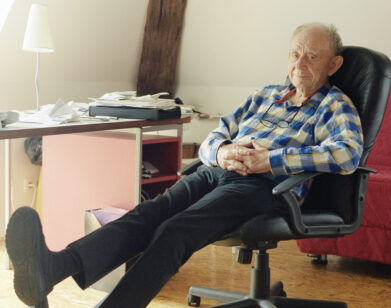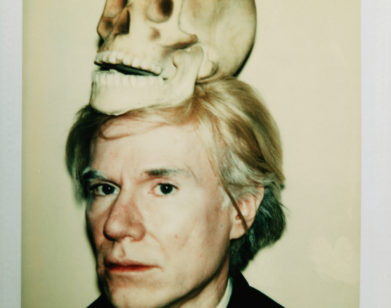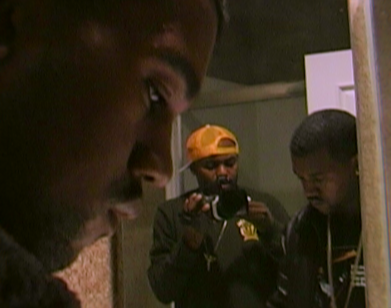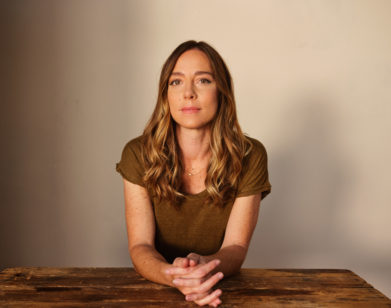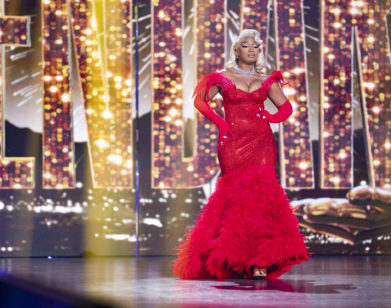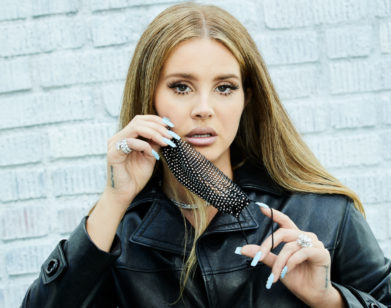IN CONVERSATION
“Trans is Everywhere”: Tony Zosherafatain and Trace Lysette on Trans in Trumpland
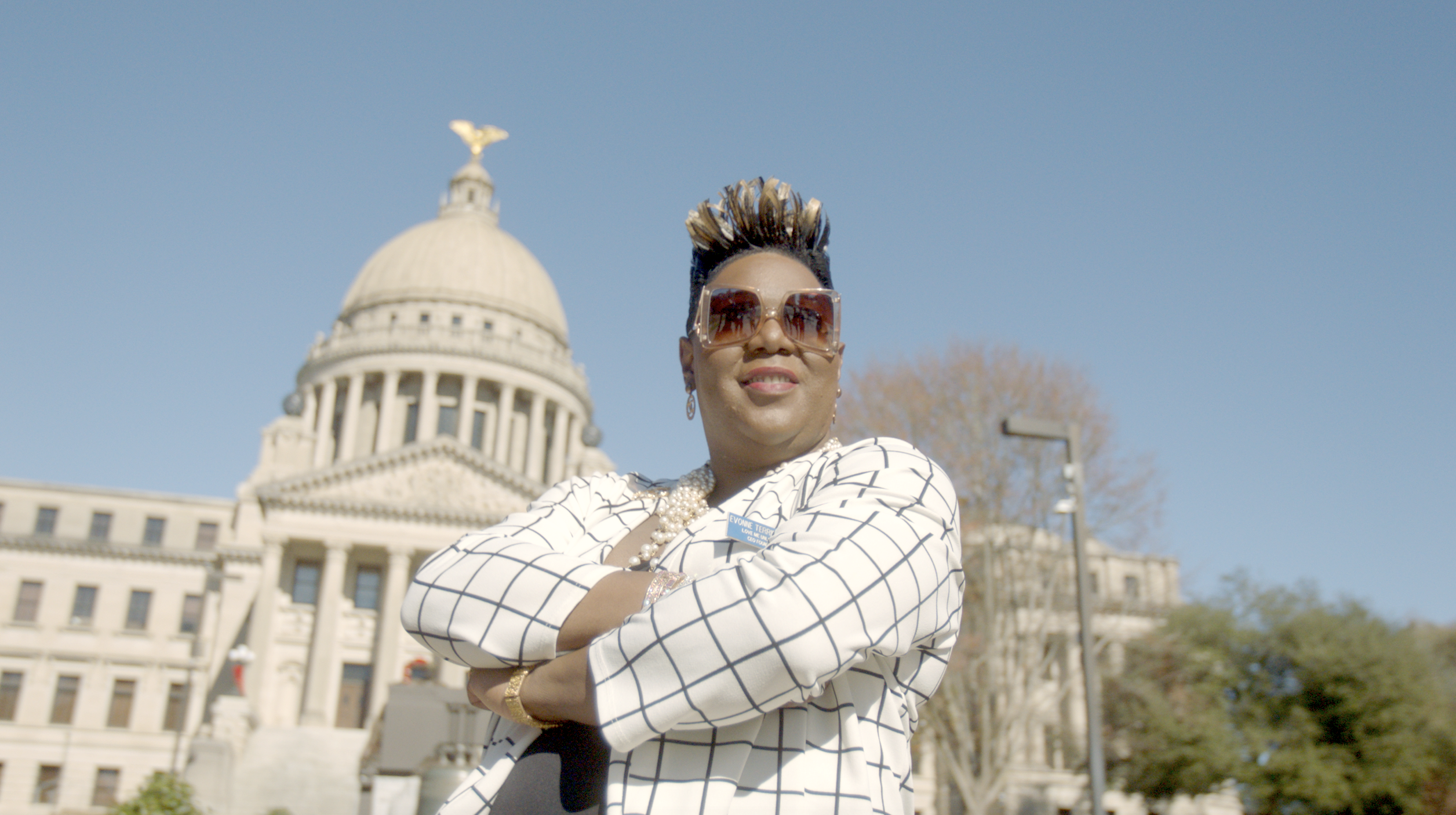
Evonne in Trans in Trumpland.
The Iranian-American trans director Tony Zosherafatain has released a film that couldn’t be more timely. Trans in Trumpland is a four-part documentary series that was released on major VOD platforms on February 25th. Created by the trans-owned production company TransWave Films and executive produced by the trans actor Trace Lysette (Transparent, Hustlers), the series follows Zosherafatain as he travels cross-country to visit each episode’s main subject, shedding light on the trans experience throughout America. The four subjects include a 13-year-old boy named Ash living in North Carolina (home to the discriminatory “bathroom ban”), a Latinx trans woman named Rebecca living in Texas who experienced the effects of the transphobic immigration system, a Black trans woman named Evonne who runs Mississippi’s only trans-non-profit, and a Native American Army vet named Shane from Idaho who was directly affected by the Trump administration’s trans military ban. In honor of the film’s release, Zosherafatain hopped on the phone with Lysette to discuss the series, the importance of trans representation, and how Gen Z is ushering in a more inclusive and hopeful future. —JULIANA UKIOMOGBE
———
TRACE LYSSETTE: Hi, Tony.
TONY ZOSHERAFATAIN: Hi, Trace.
LYSETTE: I’m going to jump right into this. What made you decide to direct Trans in Trumpland?
ZOSHERAFATAIN: So I had been working in film part-time doing documentaries. I was focusing on trans stories abroad. I filmed a trans man in Norway. So I was thinking about what kind of new documentary I would be doing. In 2016, when Trump took office, I remember that first week just feeling really scared. He removed any mention of LGBTQ rights at all from the White House website, and I couldn’t really sleep. It was hard. Three days into his presidency, Trans in Trumpland just popped right in. It was like, “There you go. Run with this, kid.” And then I had to think about what exactly this would mean. What kind of documentary would this be? I just had a feeling [Trump] was going to attack our community even worse than that first week.
LYSETTE: Yeah. I remember that feeling too, right when he took office. It was this feeling of disbelief.
ZOSHERAFATAIN: Exactly. And you probably couldn’t sleep too, right? Like nightmares?
LYSETTE: I didn’t have nightmares because I’m old school. I guess, just being a trans person from the late ’90s—early 2000s was when I transitioned—I was upset that we were going backwards because we’d finally seen some progress, and it was an eye roll moment for me. It was like, “Wow. Okay. We’ve got to do this again?”
ZOSHERAFATAIN: It was really disappointing because I feel like in those eight years under Obama, yeah, sure, he wasn’t perfect, but he did respect our existence. We would’ve probably been on the path to federal rights like healthcare if Hillary had won. That’s how I felt that first week. I was like, “What the hell?” So, I thought to myself, this title is something I’ve got to roll with. In 2016, I was thinking about it loosely. It wasn’t really until 2017 that I really felt a kick in the butt to create the series. If I recall, it was either 2017 or 2018 when he tried to pass that bill that was like “trans people don’t exist.” He tried to change the federal policy. That was one of the worst. I was like, “I need to create this documentary.”
Jamie, my producer, and I thought to ourselves, “Well, we want to make a film, but we need funding.” So we got on Kickstarter, raised money through there, really tapped into our network, and so once we got the funding, we produced everything in 2019. The series came together when I found the four characters. I wanted strong, diverse characters: a Black trans woman, a Latina, a young trans man, a native two-spirit person. The series was born out of political and survival necessity.
LYSETTE: Do you think it’s important for us to direct our own stories?
ZOSHERAFATAIN: Yeah. That’s something I struggle with all the time. Why are trans stories being directed by cis folks? I don’t know. People do profit off of our stories, unfortunately.
LYSETTE: They definitely do.
ZOSHERAFATAIN: That’s a reality. The trans experience is a very, very specific experience in your body. You can’t make it up unless you’ve been through it. So I think when you don’t have a trans person behind the camera directing and producing a trans film, you lose authenticity and you lose the realness to the identity and the experience.
LYSETTE: Well said. What was it like to film as a trans person in some of the most conservative states in the country, and do you have any horror stories from production that you’d like to share? Or maybe something that was funny?
ZOSHERAFATAIN: To be real with you, we didn’t share the titles with anyone on production at all. People would be in the street like, “What are you guys filming?” In North Carolina, they thought we were part of the Hunger Games crew because Hunger Games films where we were in North Carolina. And we were like, “We can’t tell you.” And they’ll be like, “Why can’t you tell us?” So some people would get very intrusive, but we never would say we’re filming a trans thing called Trans in Trumpland, because who knows? They could get a shotgun.
LYSETTE: Exactly. Your safety could be in jeopardy. If you tell them the title, it’s going to bring about a whole other set of problems. I get it.
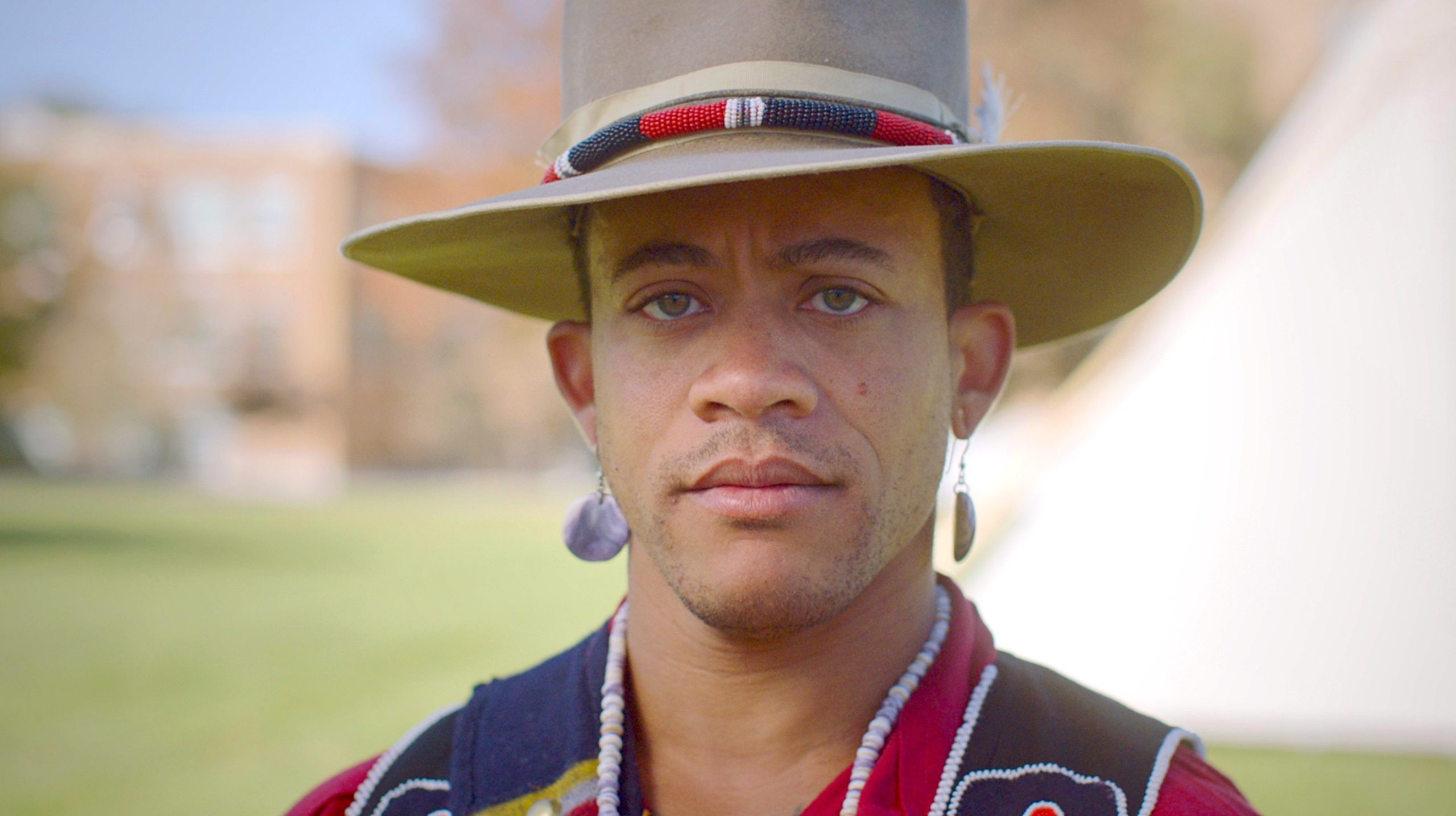
Shane in Trans in Trumpland.
ZOSHERAFATAIN: But there were good times. The funny times came with chilling with the crew, like eating Reese’s after and watching films and stuff, just having a good time after production. Laughing with the characters, laughing with their friends and family. Those were the good moments. There were times, like in Idaho, where we told someone at a cafe—they were like, “Oh, you guys have a large order. What are you guys?” And we’re like, “We’re a production crew.” They’re like, “Oh, who are you filming?” And we’re like, “Oh, we’re filming local native trans activists.” And the woman was like, “I feel so bad.” And she was white, non-Native. And she was like, “I feel so bad about what our country has done to Native Americans.” I was shocked. This is in rural Idaho. I was like, “Wow. She really said that comment.” And it just felt nice to see people have love in themselves all over. And I thought that was really cool.
LYSETTE: Even though we don’t always realize it, there is that kind of empathy in every corner of this nation, even though it’s outnumbered in certain parts. I do think that hearing things like that gives us hope that people can kind of think for themselves, and that empathy and humanity can definitely be the light at the end of the tunnel. It’s interesting to see young trans folks, like Ash in episode one, come out at such a young age. As a trans man in your 30s, how was it different for you growing up?
ZOSHERAFATAIN: I saw Ash talk about how cool his friends were about him coming out, and he came out at 12. I was like, “What?”
LYSETTE: I can’t even imagine that. I tried to tell my mom that I liked boys when I was 12, but the trans thing happened a little bit later, and it did not go over well.
ZOSHERAFATAIN: Same for me, literally. I came out as a lesbian and my family kind of accepted that, but then the trans thing—they disowned me for two years. And holy shit, Gen Z are so woke. They’re literally nonbinary. Like, you and me, as binary trans people, we’re out of date for them.
LYSETTE: Oh, I know. It’s wild. The sexuality thing was not really accepted. And then the gender thing definitely was not accepted. Our generation had to deal with being estranged from our blood family. I mean, that’s just how serious it was. So when I see stories like Ash, I’m just blown away by some of the acceptance in his circle.
ZOSHERAFATAIN: When I met him, it blew me away, because I was like, A) you really had it in your soul to figure out you’re trans at 12. And B), you were able to find someone on YouTube, or find yourself on TV, and know what the word trans was, and tell your mom about that. That was mind-blowing because growing up, I didn’t even hear the word trans until 19 in college at a support group. I heard lesbian, but not trans. I mean, we didn’t have computers until middle school. So now these younger trans kids are blessed because they have YouTube, they have TikTok. Trans is everywhere.
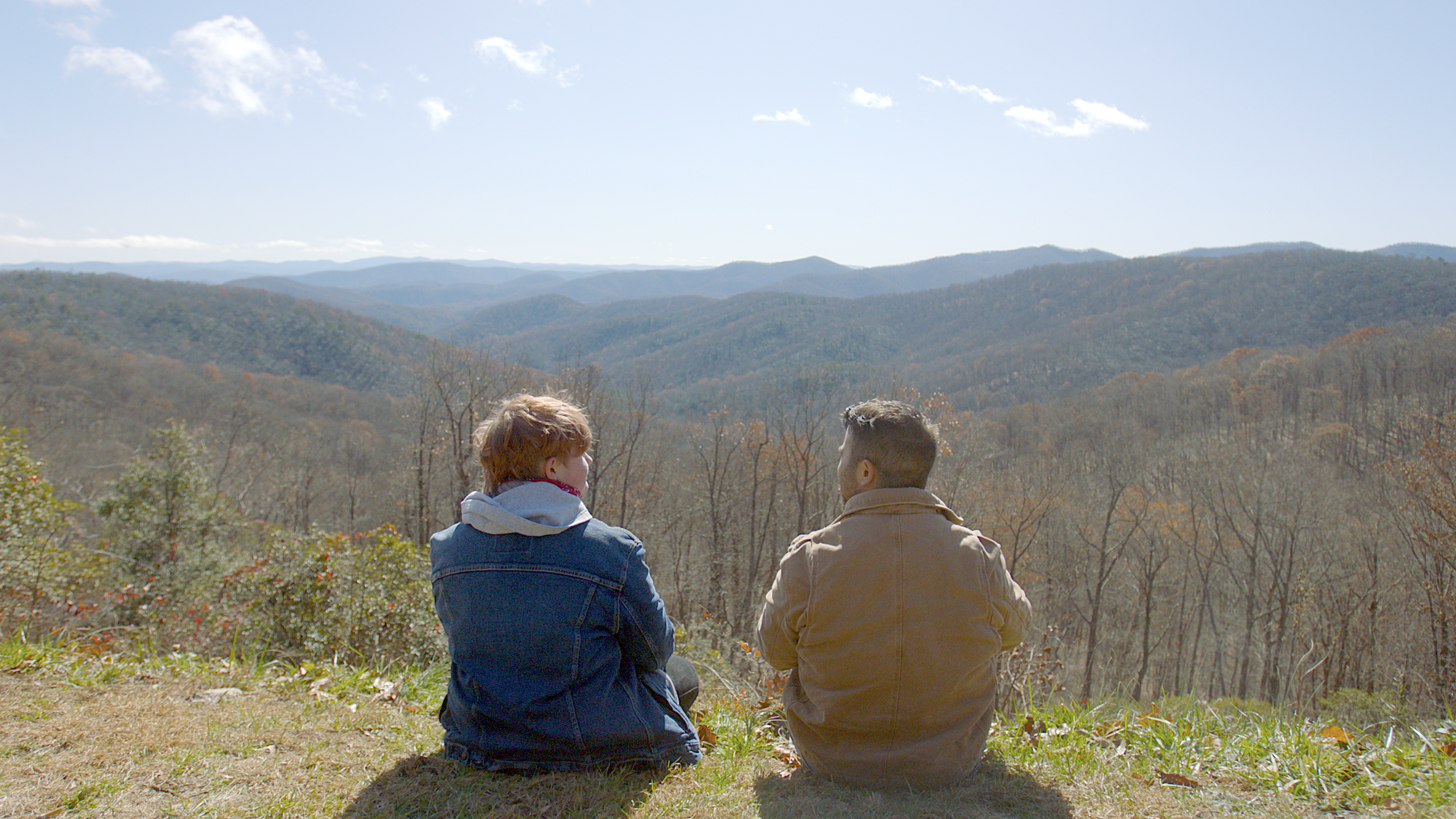
Zosherafatain with Ash.
LYSETTE: It’s a whole different world.
ZOSHERAFATAIN: I’m really inspired by that. I feel like the future of our community is going to be good. I’m really positive about that. I’m kind of jealous.
LYSETTE: Oh, I’m jealous as hell, but I’m also happy for them.
ZOSHERAFATAIN: Yeah. I don’t know about you, but I didn’t start transitioning until 22.
LYSETTE: I started playing with gender as a teen. I was a showgirl back in Dayton, Ohio, and I had a fake ID. So I started younger, but this is the late ’90s. So it was a journey for sure. It’s a miracle I’m still here, but I’m so encouraged by seeing how the youth get to be themselves. And I know it’s not like that for all of them. I know some of them still deal with parents who just don’t understand, but it is encouraging to see stories like Ash. What do you want this series to achieve? What do you want the trans community to have now and into the future?
ZOSHERAFATAIN: I think the series shows that trans people have existed across all time, but just for the series specifically, we are all across this country. Everywhere. It doesn’t matter. The Heartland, Midwest, South, wherever. I want trans people to see this and say, “You know what? Just because I live in this state that is more backwards, I can still lead a good life.” All four characters in Trans in Trumpland have a good life, despite everything that’s been thrown at them. They still find joy.
I just want to show trans people: you’re valid. And then for non-trans people that watch us, I want to show, “Hey, humanize us. If you don’t know about us, now you do.” And that’s what I want the main takeaway to be. I want anyone to watch this and know that we’re all human at the end of the day. We all kind of want similar things.
LYSETTE: I totally agree. Do you think that trans cinema is at a tipping point, and what do you think is next for us in terms of visibility on screen?
ZOSHERAFATAIN: We’ve supposedly been tipping, but we’re not there yet.
LYSETTE: Have we been tipping? Because I can’t tell.
ZOSHERAFATAIN: I know. It’s like, I don’t think we’ve been tipping at all.
LYSETTE: Teetering, maybe.
ZOSHERAFATAIN: Yeah. We’re teetering on the brink, but to be honest with you, I think trans cinema has progressed, but at the same time, I think that we need to be in more leadership roles in Hollywood, specifically behind the camera, directing, producing, having our own production companies, being on the financing end. Because ultimately, that kind of aspect of being behind the camera could be very powerful. That’s how we can shape better trans stories. And also, trans people getting more acting roles that aren’t trans. Just everyday people.
LYSETTE: Oh yeah. I mean, I couldn’t agree with you more. I know as an actress, I just got so frustrated with the lack of opportunity that was out there. I started acting in 2007. So just over the course of the last five years even, we’ve seen glimmers of hope, but then it’s almost like a new glass ceiling gets put in place and they just don’t really want us to thrive. Or if they do, there’s only room enough for one, or maybe two. And there’s so many of us out here just plugging away, beating the pavement, auditioning, taking the rejection. It does make you wonder.
I’ve been so frustrated that I even took to writing, and I’ve been lucky to get a show in development at FX, but there’re no promises. And every step of the way I doubt myself, I doubt the industry, I doubt the gatekeepers. I try to stay hopeful, but it’s really daunting. And when you live in a world that is constantly attacking your identity, it makes it hard to think about a world where you can thrive and bloom and have abundance in your life, whether it’s love or career or success. Somehow we have to try and keep it tipping.
ZOSHERAFATAIN: I think trans stories have a lot of potential. There’s a lot of activist stories. And even trans historical figures, their stories haven’t been told. The modern-day trans people’s stories haven’t been told. I want to see more trans love stories.
LYSETTE: I would love for it to be less about the trans journey or the transition story, and more just about everyday life for us. There’s all this stuff that is so interesting, but also relatable and universal, that every person deals with. And I think that when we get to those stories, then we’ll start to see us leading films, and leading series, and being present at the award shows, and not being snubbed all the time. It’s just so exhausting to see so many of my trans siblings doing great work, and we often just get overlooked. So I definitely feel you on that. Speaking to that, tell me more about your production company, Trans Wave Films.
ZOSHERAFATAIN: Trans Wave started before I produced Trans in Trumpland. I started it with Jamie. He is someone I’ve worked with since 2012 or 2013. So we decided, “Hmm, we’ve got to take our filmmaking to the next level. We’ve got to start our own LLC production company.” Especially with something where we were working on a larger budget than we had in the past with Trans in Trumpland. So Jamie’s like, “Let’s start this production company on the idea that it’s trans people in front of the camera and behind the camera.” So we got it up and running. We’re happy that we did so well with Trans in Trumpland and it got picked up. There’ll be more stories that we want to tell: documentaries, narrative stuff, some reality TV stuff. Jamie and I are very committed to authentic trans storytelling.
LYSETTE: Oh, that’s so necessary. I’m so happy you’re doing that. So, I guess, outside of your activism and your art, what do you do to keep yourself sane or happy? Because I know as trans people, we have so many layers outside of our transness.
ZOSHERAFATAIN: Self-care for trans people and filmmakers is crucial. For me personally, I really like talking to my friends. I’m pretty chatty. I like working out, running, lifting weights, swimming. I love the beach. I’m very spiritual. Keeping myself grounded through meditation. Love traveling, hiking, stuff like that. I just also love food, cooking. So that’s all of me, layered and grounded.
LYSETTE: I feel you. I do a weekly Zoom brunch every Sunday with Laverne Cox, Peppermint, MJ Rodriguez, and a few other trans girlfriends of mine just to touch base and keep ourselves sane. I feel like this past year has been pretty rough on the soul. And so self-care for me has come in the form of community and really holding my friendships near and dear. We really had to dial back in this year and figure out what really matters. And for me, it’s those personal relationships. My career is very important to me too, but at the core of who I am, I think it’s really about the people in my life and my loved ones, whether they’re blood or chosen.
ZOSHERAFATAIN: That’s kind of crazy how it took a pandemic for us to realize these things.
LYSETTE: So many awakenings this year. It’s been hard, but obviously necessary.

